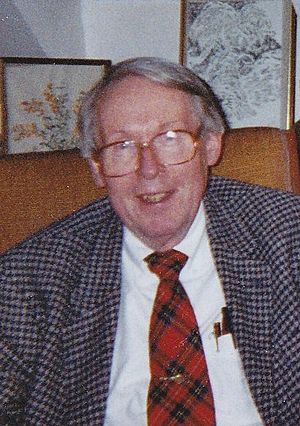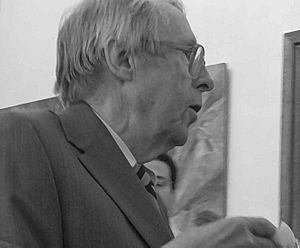Jaakko Hintikka facts for kids
Quick facts for kids
Jaakko Hintikka
|
|
|---|---|

Jaakko Hintikka in 2003
|
|
| Born |
Jaakko Kaarlo Juhani Hintikka
12 January 1929 Helsingin maalaiskunta, Finland
|
| Died | 12 August 2015 (aged 86) Porvoo, Finland
|
| Nationality | Finnish |
| Education | University of Helsinki (Ph.D., 1953) |
| Awards |
|
| Era | 20th-century philosophy |
| Region | Western philosophy |
| School | Analytic philosophy |
| Institutions | |
| Thesis | Distributive Normal Forms in the Calculus of Predicates (1953) |
| Doctoral advisor | Georg Henrik von Wright |
| Doctoral students |
|
|
Main interests
|
|
|
Notable ideas
|
|
Kaarlo Jaakko Juhani Hintikka (born January 12, 1929 – died August 12, 2015) was an important Finnish thinker. He was a philosopher and a logician. This means he studied big questions about life, knowledge, and how we think. He also worked with logic, which is like the rules of good reasoning.
Contents
Jaakko Hintikka's Life and Work
Jaakko Hintikka was born in a place called Helsingin maalaiskunta, which is now known as Vantaa, Finland.
In 1953, he finished his studies and earned his doctorate degree from the University of Helsinki. His main project was a paper about "Distributive Normal Forms in the Calculus of Predicates". He learned a lot from his teacher, Georg Henrik von Wright.
Hintikka spent many years teaching and researching. He was a Junior Fellow at Harvard University for a long time. He also held important teaching jobs at the University of Helsinki and the Academy of Finland. Later, he taught at famous universities like Stanford University, Florida State University, and Boston University. He worked at Boston University from 1990 until he passed away.
He was a very busy writer. He wrote or helped write over 30 books and more than 300 articles for academic journals. His ideas were about many different areas. These included mathematical logic (using math for reasoning) and philosophical logic (how logic connects to philosophy). He also wrote about the philosophy of mathematics (the ideas behind math). Other topics were epistemology (the study of knowledge), language theory (how language works), and the philosophy of science (the ideas behind science). His writings have been translated into more than nine languages.
Hintikka was also involved in many academic groups. He was the editor of an important academic journal called Synthese for 40 years. He also advised more than ten other journals. He held leadership roles in several international philosophy organizations. These included the International Federation of Philosophical Societies and the Institut International de Philosophie. He was also a member of groups like the American Philosophical Association. In 2005, he received the Rolf Schock Prize. This award was given to him for his new ideas about how we understand knowledge and belief.
He was a member of the Norwegian Academy of Science and Letters. In 2000, he received an honorary doctorate from Uppsala University in Sweden. This was a special award to recognize his important contributions.
What Jaakko Hintikka Studied
Hintikka is known for starting a new way of thinking called formal epistemic logic. This is a special type of logic that helps us understand what people know and believe. He also created something called game semantics for logic. This idea uses games to help explain how logic works.
Early in his career, he developed a way to understand modal logic. Modal logic deals with ideas like possibility and necessity. He also discovered a method called the semantic tableau. This is a tool used to check if logical statements are true.
Later in his career, he focused more on game semantics. He also worked on something called independence-friendly logic. He believed this type of logic better showed how we think about "quantifiers". Quantifiers are words like "all" or "some" that tell us how many of something there are.
Hintikka also studied the works of other famous thinkers. He wrote important papers about Aristotle, Immanuel Kant, Ludwig Wittgenstein, and Charles Sanders Peirce. His work continued a style of philosophy called "analytic philosophy." This way of thinking focuses on breaking down ideas into smaller parts to understand them better. Other famous philosophers like Gottlob Frege and Bertrand Russell also worked in this style.
For example, in 1998, he wrote a book called The Principles of Mathematics Revisited. This book explored new ideas about mathematics, much like Bertrand Russell did in his famous book from 1903.
Selected Books by Jaakko Hintikka
Here are some of the books Jaakko Hintikka wrote:
- 1962. Knowledge and Belief – An Introduction to the Logic of the Two Notions
- 1969. Models for Modalities: Selected Essays
- 1975. The intentions of intentionality and other new models for modalities
- 1976. The semantics of questions and the questions of semantics: case studies in the interrelations of logic, semantics, and syntax
- 1989. The Logic of Epistemology and the Epistemology of Logic
- 1996. Ludwig Wittgenstein: Half-Truths and One-and-a-Half-Truths
- 1996. Lingua Universalis vs Calculus Ratiocinator
- 1996. The Principles of Mathematics Revisited
- 1998. Paradigms for Language Theory and Other Essays
- 1998. Language, Truth and Logic in Mathematics
- 1999. Inquiry as Inquiry: A Logic of Scientific Discovery
- 2004. Analyses of Aristotle
- 2007. Socratic Epistemology: Explorations of Knowledge-Seeking by Questioning
See also
 In Spanish: Jaakko Hintikka para niños
In Spanish: Jaakko Hintikka para niños
- Rudolf Carnap
- Saul Kripke
- Charles Sanders Peirce
- Willard Van Orman Quine
- Alfred Tarski
- Ludwig Wittgenstein
- Doxastic logic
- Hintikka set


